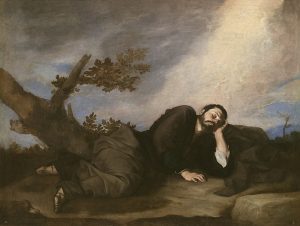Thoughts on Sunday’s Lessons for July 19, 2020
First Reading (Track One): Genesis 28:10-19a
Signs of God’s abundant love and the gift of grace shine through Sunday’s readings.

Jacob’s Dream (1639), oil painting on canvas by Jusepe de Ribera (1591-1652). Museo del Prado, Madrid. (Click image to enlarge.)
In our Track One first reading, Jacob, a conniving trickster, got himself in trouble and now is on the run. He fears the murderous wrath of his angry older twin Esau, whom Jacob tricked out of his inheritance and their father’s blessing. Now Jacob stops to rest. Sleeping in the desert on a stone pillow, Jacob has a remarkable dream of angels going up and down a celestial ladder. Then he hears God’s voice repeating the promise that God gave to his grandfather Abraham and to his father Isaac: God is with him, and his offspring will fill the Earth. Why would God reward such a sneaky cheater? God knows that no human is perfect, but God still loves and protects even broken, troubled people.
First Reading (Track Two): Isaiah 44:6-8
Isiah’s short, poetic prayer of praise in our Track Two first reading assures the people that their exile in Babylon will eventually end and that they will return home to Jerusalem. The prophet imagines God speaking in the first person, declaring God’s own power and majesty. Whatever beliefs their captors may hold in other gods and other prophecies, Isaiah makes clear that Israel need not fear or be afraid. As they have known since days of old, God is the nation’s rock, redeemer and leader, the first and last of all creation, beside whom there is no other god.
Psalm (Track One): Psalm 139:1-11, 22-23
When Jacob ran from angry Esau, he might have prayed something like this Track One Psalm. God loves us and knows everything about us, the Psalmist sings. We may run from God, but we can’t hide. In heaven or in the grave, in darkness or in light, up in the sunrise sky or down in the deepest part of the sea, no matter where we go or how we try to hide, God knows where we are and what we are thinking, God will lead us, hold us and keep us. Even when we are wicked, God will lead us in right paths.
Alternative to the Psalm (Track One): Wisdom of Solomon 12:13, 16-19
The Wisdom of Solomon is a short book in the Apocrypha. It was written in the name of King Solomon not long before, or even possibly during or after, the time of Jesus and the evangelists. These verses harmonize with the faith expressed in Psalm 139 above in their ringing praise for a powerful, righteous God who reigns over all creation, yet judges the people mildly and with forbearance, teaching us that to be righteous requires us to be kind.
Psalm (Track Two): Psalm 86:11-17
The Psalmist expresses gratitude for God’s abundant love shown in protection against the violence and threats of enemies. Like the people in exile in today’s Track Two first reading from Isaiah, he faces difficulties – even being trapped in the “nethermost Pit” and pursued by a band of violent men. Nevertheless he turns to God with faith and trust, calling on God to respond out of grace and compassion, kindness and truth, to turn to him and have mercy, shaming his foes with a sign of God’s favor.
Second Reading: Romans 8:12-25
We are following Paul through his letter to the Romans for three full months in this season after Pentecost as he talks about what life in the Spirit of Christ looks like. Summing up his argument in today’s passage, he reiterates: If we live by our own selfish desires, we die. But if we live in the Spirit through Christ, loving God and our neighbor even as we suffer with Christ – as the Roman Christians had suffered through persecution – we are glorified with him and become adopted children and heirs of God. Hope for what we do not yet see and wait for it with patience, he concludes.
Gospel: Matthew 13:24-30, 36-43
Jesus was a carpenter, not a farmer, but he sure did tell a lot of parables about farming, planting, and growing things. Continuing in the spirit of last Sunday’s parable about the sower, he moves on to a discussion of weeds in the wheat field. In this parable the soil is good, and so is the seed. The sower is planting wheat in the rich soil of his own field, only to have an enemy sneak in at night and plant weeds among the good wheat. Now the sower can’t uproot the weeds without disturbing the wheat, so it all has to grow together until harvest, when the weeds can finally be torn out and discarded. Jesus’ explanation to the apostles may seem disturbing with its talk of hellfire and damnation for the weeds; but it’s clear that those who live righteously will enjoy God’s kingdom.
